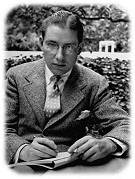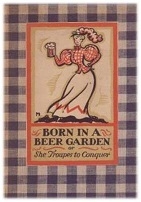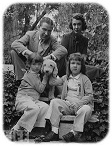This clever poem illustrates Ogden Nash’s unique style: always either thrillingly long or blessedly short — and usually rhyming. Fredrick Ogden Nash’s amazing life began on August 19, 1902 in the charming town of Rye, New York. His father, Edmund Strudwick Nash, worked in the import-export business; the father also had the responsibility of a husband to Mattie Nash. The family had high social status; so much so that the city of Nashville, Tennessee bore the name of one of the famous Ogden ancestors from the Revolutionary era in North Carolina. Ogden’s life reflects one of humorous free verse and many different jobs and unarguably remains as one of the best American poets of all time.
 |
| Ogden in early life (hilobrow.com) |
Nash’s childhood continued through many moves around the East Coast, even once living in Savannah, Georgia. Sadly, in 1921, a year after accepting a scholarship at Harvard University, he dropped out. The numerous short-term jobs that ensued afterward gave Ogden enough money to live, but some did not have much return. For example, Nash worked on Wall Street for a time, but he only ended up selling one bond — to his godmother — probably related to all the afternoons spent lounging with his few friends in the movie theaters. Ogden held many other jobs, like a schoolteacher, an advertiser for a streetcar company, and finally, in 1925, a publishing company named Doubleday hired him in their marketing department. Eventually, he moved up to reading manuscripts. Ogden Nash himself said, “It was the poor quality of the manuscripts that compelled me to write.” At first, he tried the style of eighteenth-century romantic poets, but trashed their method after deciding he could not handle it. Nash contented himself with writing humorous rhymes on paper and throwing them across the publishing office.
 |
| Born in a Beer Garden (pictures.abebooks.com) |
These annotations scrawled on paper led to a joint attempt with Joseph Alger, one of his childhood friends. The 1925 book, The Cricket of Carador, started his career as a writer. Many rhyming books followed, such as one he created with a few of his associates from Doubleday called Born in a Beer Garden, or She Troupes to Conquer. This book successfully ridiculed classic literature and sent him on the road to fame. In 1930, after trashing his first poem in frustration, he recovered it and sent it to the New Yorker, a famous magazine in his time. They loved his poems so much that several years later, he left Doubleday and joined the staff at The New Yorker. His acclaimed book, Hard Lines, went into seven printings in the first year — in the middle of the Great Depression! He soon quit his New Yorker job, though, and never had a full time job after that. Ogden continued to write poems after marrying Frances Rider Leonard in 1931 and had two children: Isabel and Linell. Nash wrote a few plays, musicals, and even a screenplay for three films. S.J. Perelman, another successful writer, collaborated with Ogden on a musical, One Touch of Venus, which played in 1943 on Broadway. The musical, a runaway success, started his path to higher fame.
 |
| Ogden with his wife and children (doollee.com) |
The American Academy of Arts and Sciences elected him, as well as the National Institute of Arts and Letters. Children appealed to Nash, so his main works turned toward them. Oftentimes, his poems would consist of musings of his grandchildren, but he suffered from a number of diseases in his later years, and he related his experience in the hospital in poetic verse. A collection of them, put together after he died on May 19, 1971 and named Bed Riddance: A Posy of the Indisposed, filled an entire book with poems, just from Ogden’s stay there!
Nash frequently appeared on radio and television shows across the country. America’s love for him repeatedly showed through their eagerness to have him on shows. His fun style and “anti-establishment” humor encouraged many people through the Great Depression. Poets.org describes him as “One of the most widely appreciated and imitated writers of light verse.” His example showed me that poets with outstanding lives do exist, encouraging me to write my own poems. After his death, Morris Bishop, another outspoken poet, wrote these lines in Time, another magazine.
is the essence of Ogdenashiness.
Rich, original, rash and rational,
Stands the monument Ogdenational.
Page created on 6/5/2011 12:12:52 PM
Last edited 7/3/2025 5:18:18 PM
